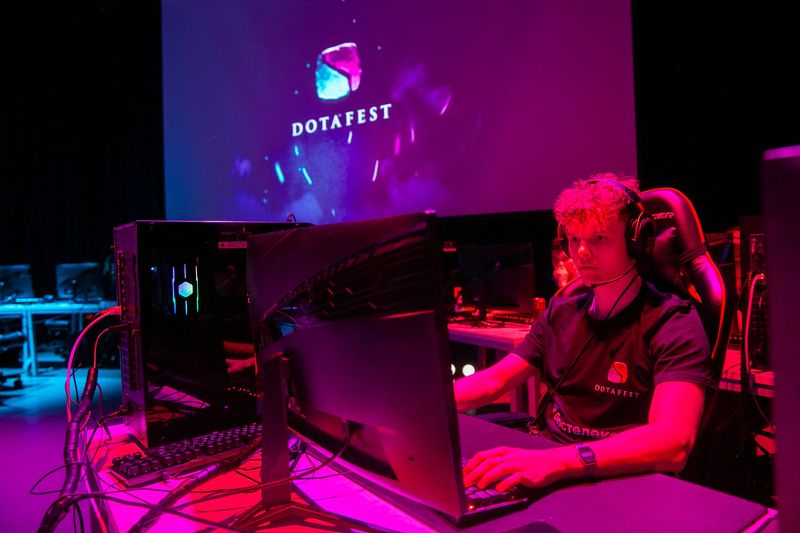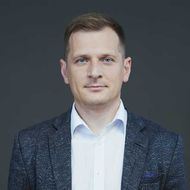Games, Cosplay, and Pizza at HSE University’s DotaFest

At the end of February, the HSE University Cultural Centre hosted the DotaFest esports festival organised by the CyberHSE society. The event was a chance for students of HSE and other Russian universities to immerse themselves in the world of popular video games and dress up as their favourite characters. There was also a round table on the development prospects of esports in Russia and the role of university societies in this effort.
After entering and registering at the festival, participants received gift pins featuring their favourite characters from video games and anime. Visitors could find their way around the venue using a video-game-style map.
The second floor hosted the university’s Contact board games club and the Movement student organisation. The video- and board-game-related activities included a creative competition in which participants could create characters and weapons from games and tv shows. The top creator was decided by a vote.
The festival also featured a Dota 2 competition between HSE HOPE (HSE University), MIREAFB (MIREA), MIET ESPORTS (MIET) and CYBERHSE (HSE University). The event was spectated by a full hall and a large online audience. All of the teams fought well, but the ultimate winner was CYBERHSE.
HSE University’s players successfully manage to train both academically and in the field of esports. ‘It’s a hobby! We have a heavy study load at the university. We will graduate as highly qualified specialists, but you have to relax and blow off steam somehow,’ explains Nikita Goncharov, co-ordinator of DotaFest, adding that the preparations for the festival lasted more than four months. ‘And as a result, we had more than 500 participants,’ he notes. ‘We invested a lot of time and energy into it—hopefully for a good outcome. People will relax and give us energy to host similar events in the future.’ Organising such events is good practice for arranging other events outside of HSE University. ‘A lot of students love gaming and are invested in everything being well organised. We want to organise regular festivals like CyberFest and DotaFest more in the future.’
Teams from all four HSE University campuses took part in the day’s event. ‘We are currently seeing a pretty serious trend regarding technological changes, particularly in IT. As a result, there is demand both from young people and from the state. One of the things HSE University does is support these trends,’ explains Aleksandr Ugriumov, Leading Engineer of the Unit for Extracurricular Activities at HSE University-St Petersburg. He spoke about plans to hold a ‘phygital’ sport tournament (combining esports and traditional physical forms of sport) at the university and inviting teams from all four campuses.
Identifying with Heroes
Participants of the festival came not only to play video games, but also to embody their favourite characters in a cosplay competition. The winner was Anastasia, a student of Game Design at the HSE Art and Design School, for her cosplay of Ahsoka Tano from Star Wars. Second place went to Anya for her cosplay of Ruined Shyvana from League of Legends. Anya said that she wanted ‘to support the people who organised such a cool event on their own initiative… I like making things with my hands—it’s inspiring.’ Elizaveta took third place for her costume of Scorpion from Mortal Kombat.

University Esports
How does educational management support esports teams? Can someone be a student and an esports player at the same time? Why do teams rotate their rosters? These were some of the issues discussed at a round table devoted to the development of esports and the role of universities.

Ilya Yaskov
HSE University Deputy Vice Rector Ilya Yaskov spoke about how the university is working on a study about university esports. ‘A summary report will be ready within the next two to three weeks, and we will of course share it with everyone,’ he said.

Maxim Fler
Maxim Fler, President of the Moscow Esports Federation, highlighted that support for esports is an important factor in students’ choice of university. ‘Last year, we started working closely with an esports organisation that is the sole operator for schools. Around one thousand school students have already taken part in our joint programmes. These same students will finish school and look for a university that, all else being equal, supports esports and has a strong team and the best community,’ he said.
One outcome of the session was the general opinion that it is necessary to create a unified platform for all Russian universities. This would allow successful esports universities to showcase their achievements and let others learn from their experience.
Text by Luiza Amelina, Research Assistant of the HSE University Laboratory for Economic Journalism, and Kirill Perov, Manager of the HSE University Laboratory for Economic Journalism
See also:
Student Esports in Russia: The Growing Popularity and Prospects of Phygital Sports
HSE University experts have found that 75.3% of male students play competitive online games at least several times a month. Among women, this hobby is much less common: only 20.2% of female students are interested in online games. The HSE News Service covers the results of an expert and analytical report, released by HSE specialists, on the development of student esports in Russian universities.


